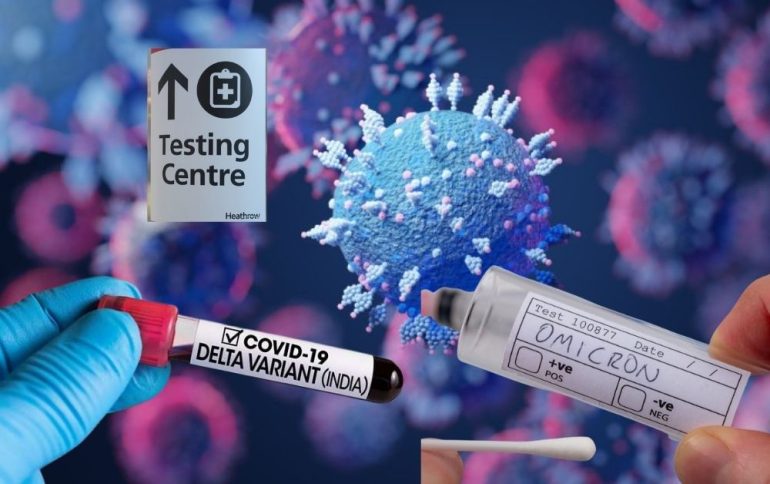Is it a simple cold, flu, omicron or delta? The "mosaic" of viruses that circulate in the community and infect the respiratory system, causing in many cases common symptoms, are called upon to be expressed by the citizens.
It is indicative that data from Britain show that about half of people who have cold symptoms actually get sick with Covid-19.
Meanwhile, just last Sunday, the European Center for Disease Control and Prevention in a new report warns that the health authorities record in the Old Continent more than the expected cases of flu.
And although in our country, at present, according to EODY, a strain of the flu virus has not yet been isolated, experts emphasize the importance of influenza vaccination while remaining on alert.
The only way for a safe diagnosis
In this foggy viral landscape, testing is the only way for a safe diagnosis, points out speaking to "NEA" the director-coordinator of the XNUMXrd Pathological Clinic of the Hospital "G. Gennimatas ”and president of the Association of Doctors of Attica and Piraeus Hospitals Matina Pagoni.
Drawing on knowledge from daily clinical experience, she adds that there are some signs that doctors suspect of what they have to deal with.
"Delta, for example, affects the lower respiratory tract. It usually causes high fever and shortness of breath, so it is easier to distinguish. "
Common symptoms also include coughing and loss of smell and / or taste, which persist for a considerable time.
"On the contrary, Omicron multiplies in the upper respiratory system", with the result that even sneezing is. Guilty.
"The infection, when it is caused by the new strain, starts with a simple nodule. "Headache, fatigue, sore throat are also common manifestations."
However, the affliction caused by Omicron is similar to that manifested by someone suffering from a common cold. The equation becomes even more complicated if one tries to distinguish the symptoms caused by the new mutation with those of the flu (cough, low-grade fever - usually below 38 ° C -, myalgia and / or headache).
"The solution, therefore, is to be tested for coronavirus immediately after the onset of the first symptoms. But even if the result is negative, it must be submitted in another one after four days. And of course, whether it is a coronavirus or another infection, the golden rule is to limit oneself in one's home when one does not feel well, faithfully observing the protection measures ", concludes Matina Pagoni.
What applies to children
The same does not apply to children, as dr. Sarah Ash Combs, pediatrician in Washington, DC, USA, where juvenile hospitalization has increased significantly in recent times.
We are at a point where people should treat the symptoms of the common cold or flu as suspicious and for Covid-19, explains the expert, emphasizing that "when in a family a child has a sore throat and sore throat, you can not know for sure what it is without a test".
He adds that children experience Omicron in the same way that adults experience it, that is, with mild symptoms reminiscent of those of the common cold.
The danger of Delmicron
Meanwhile, the doctors of the Therapeutic Clinic of the Medical School of the University of Athens, Theodora Psaltopoulou, Giannis Danasis, Panos Malandrakis and Thanos Dimopoulos (Rector of EKPA) warn that people with weakened immune systems but also older citizens with advanced age and risk "of contracting both SARS-CoV-2 strains, namely the Micron and the Delta.
Infection with both strains (Delmicron) can also be observed in areas with low vaccination population. "And this is because the Omicron strain may be the dominant one, however the Delta strain has not disappeared."
The possibility of concomitant infection
They point out, however, that in the general population the probability of co-infection with two strains of SARS-CoV-2 is low, however in cases of overcrowding both Delta and Omicron cases may coexist.
"If people with weakened immune systems are found in the crowd, they will most likely be exposed to both strains and may develop clinical disease in both strains. "The symptoms are essentially a combination of the two strains and include a feverish cough, anomaly, tastelessness, headache, runny nose and sore throat."
Similarly, the recent case of a pregnant woman in Israel confirmed the risk of dual disease from Covid-19 and flu.
"Both infections have common symptoms, such as cough, fever and runny nose. Different PCR tests for influenza virus and SARS-CoV-2 may in any case clarify the etiology of the symptoms. "Both infections can have serious complications, such as pneumonia, acute respiratory failure, multi-organ failure, heart attacks, encephalitis, myocarditis, ischemic stroke and death," added experts from the National and Kapodistrian University
in.gr
